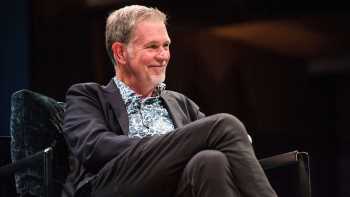After dominating the subscription streaming scene for so long, Netflix is girding for a new phase in the SVOD wars with the entry of more deep-pocketed players like Disney and Apple, CEO Reed Hastings said Friday.
“While we’ve been competing with many people in the last decade, it’s a whole new world starting in November…between Apple launching and Disney launching, and of course Amazon’s ramping up,” said Hastings, who also cited NBCUniversal’s coming Peacock service. “It’ll be tough competition. Direct-to-consumer [customers] will have a lot of choice.”
He said Netflix would continue to hew closely to its core strategy of offering content for binge viewing, the phenomenon it helped create. That means the service isn’t moving into live sports, as Amazon Prime Video has, and won’t experiment much with different release models, including for its expanding catalogue of original films. “They may have a qualifying run for theatrical, but it’s fairly small,” Hastings told the Royal Television Society conference in Cambridge, England.
In the U.K., Netflix has spent £400 million (about $500 million) over the past year and plans to increase the amount next year, Hastings said. In July, the company announced that it was establishing a production hub at Shepperton Studios, outside London. Its first production there is Charlize Theron’s “The Old Guard” for Netflix and Skydance.
Hastings warned that steadily rising production costs would climb even higher with the advent of the likes of Disney Plus and AppleTV Plus. Disney, too, has vacuumed up valuable production space in Britain, signing a long-term lease at historic Pinewood Studios. “Someday ‘The Crown’ will look like a bargain,” Hastings said.
He revealed that Netflix had tried to acquire “Fleabag” but was outbid. Amazon has the hit Phoebe Waller-Bridge show in the U.S. and the U.K.
Hastings also reiterated that his company was not interested in buying production or post-production companies: “We’re not in the acquisition business.” And he dismissed concerns that a handful of digital media giants, including Netflix, would monopolize the television market. “We win only about 5% of television viewing hours, so we’re nowhere near a concentration risk,” he said.
Popular on Variety
Source: Read Full Article
